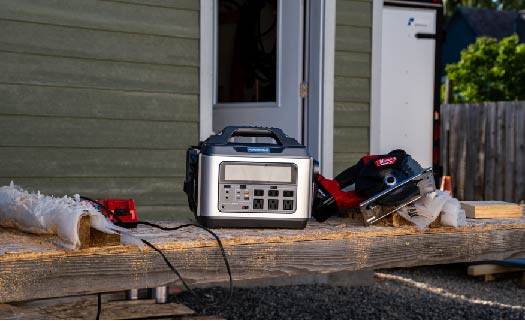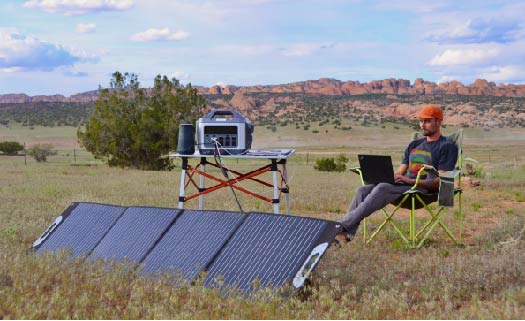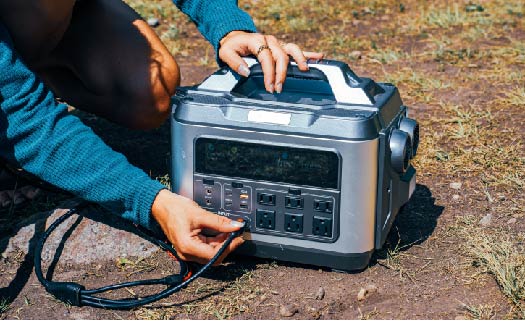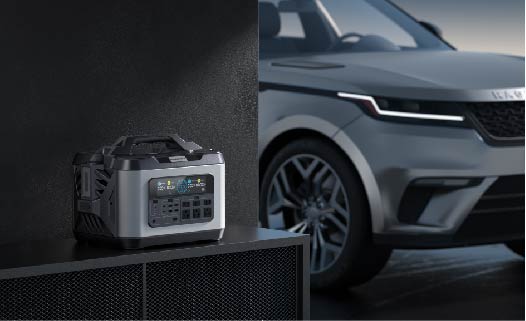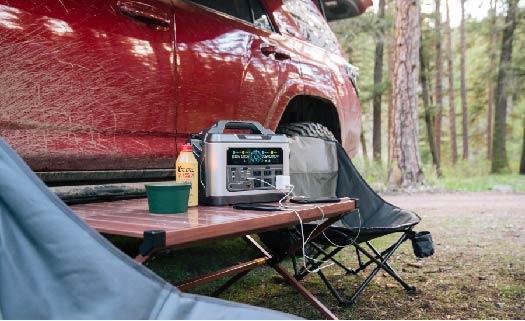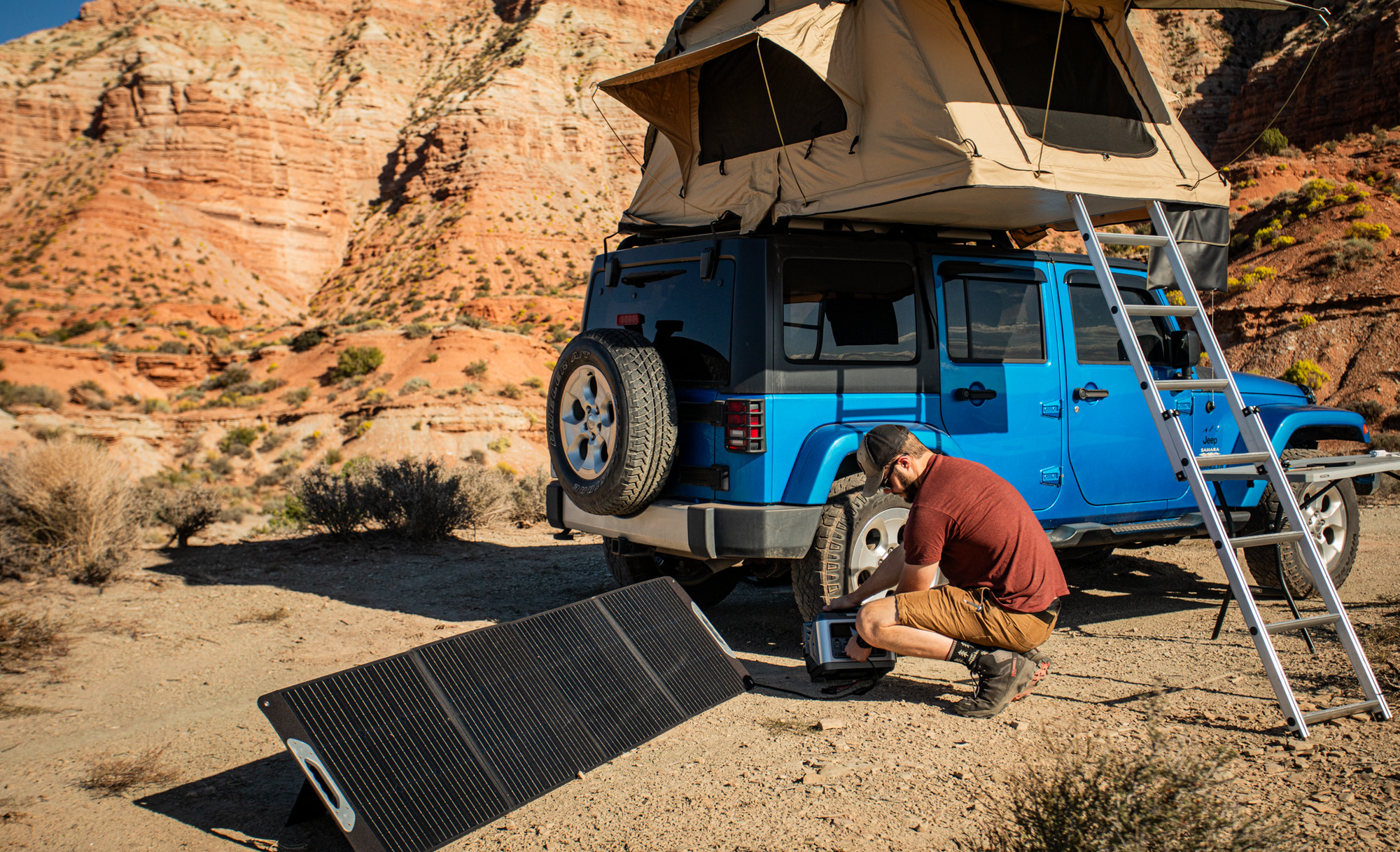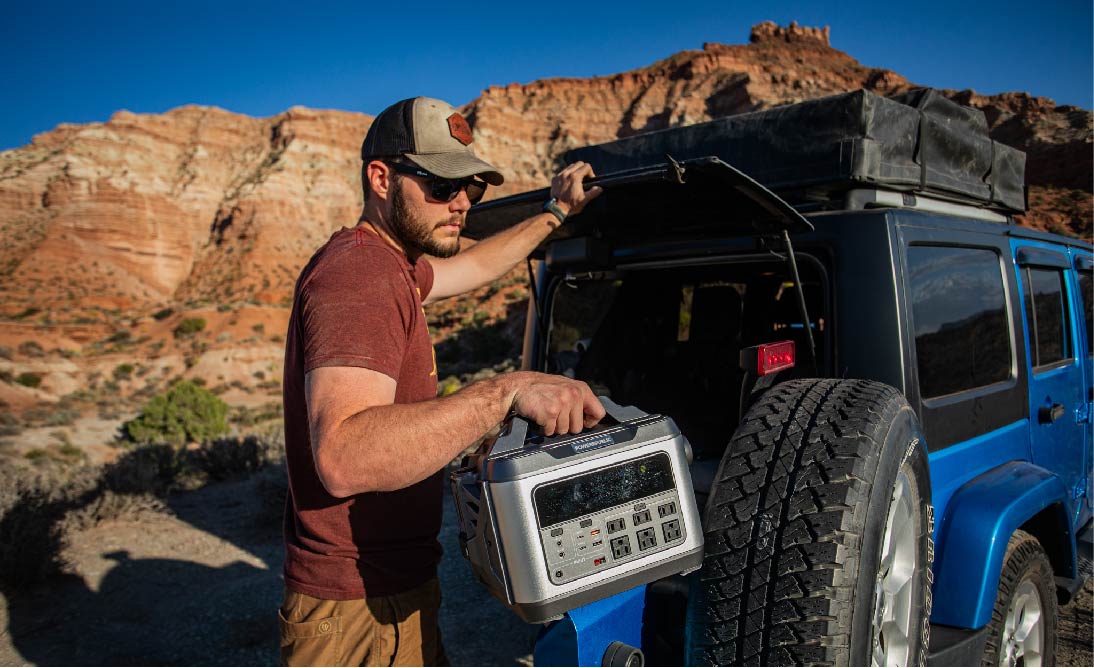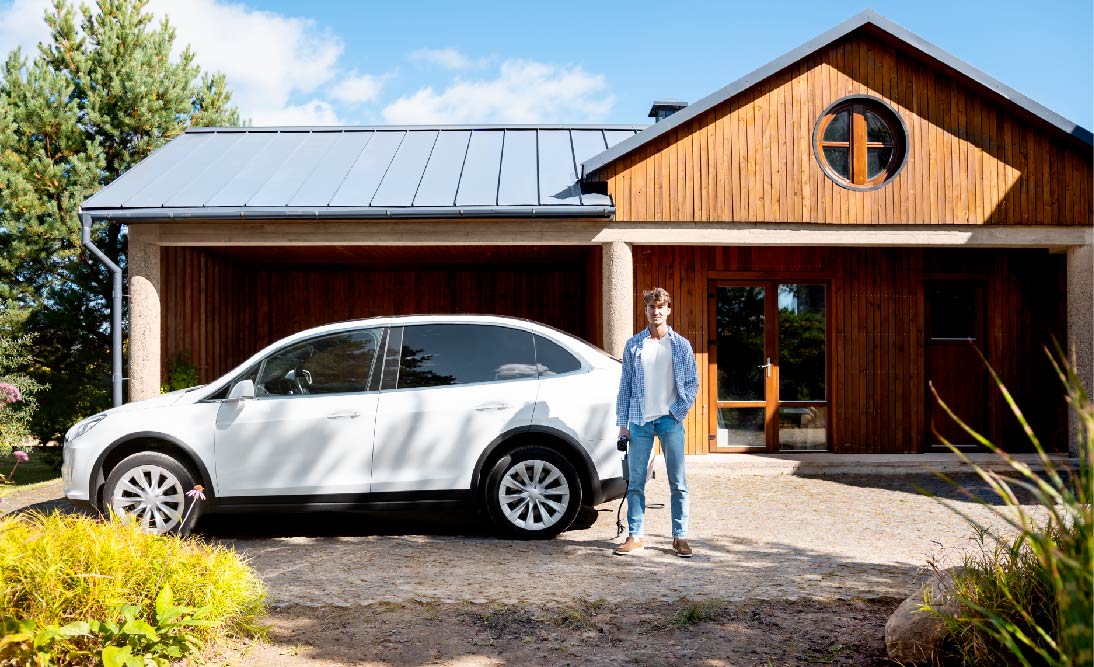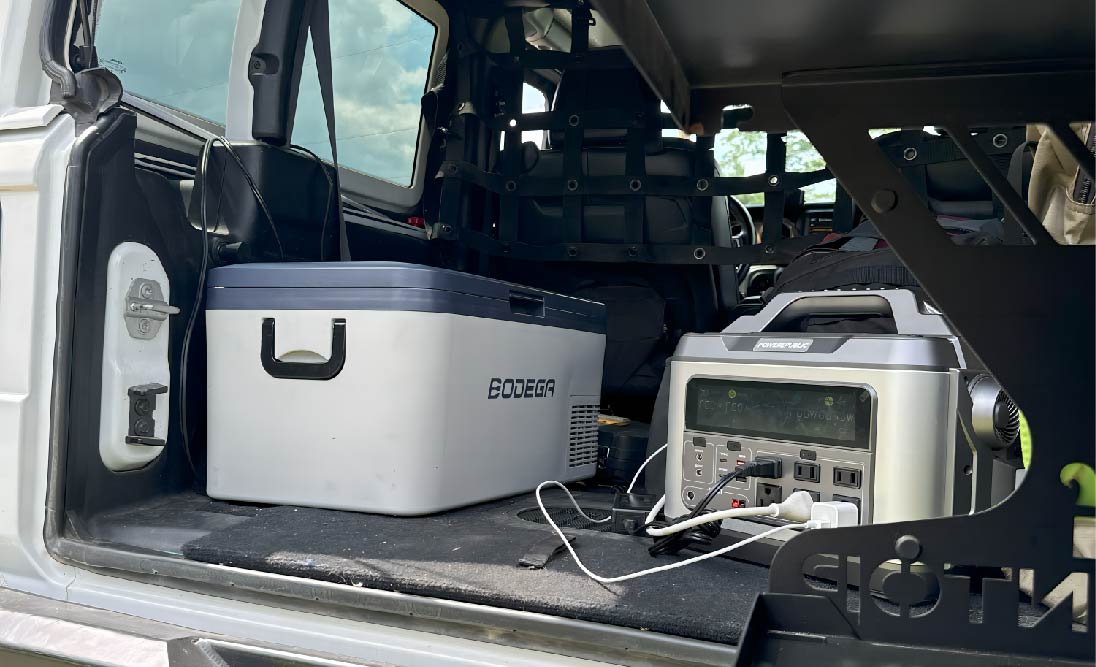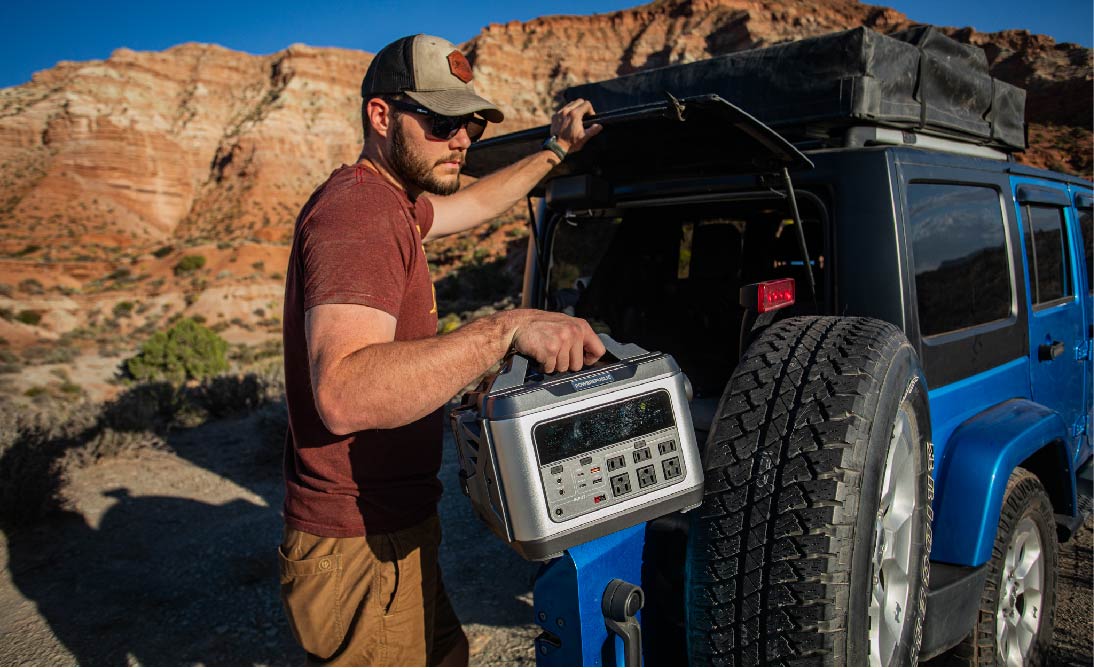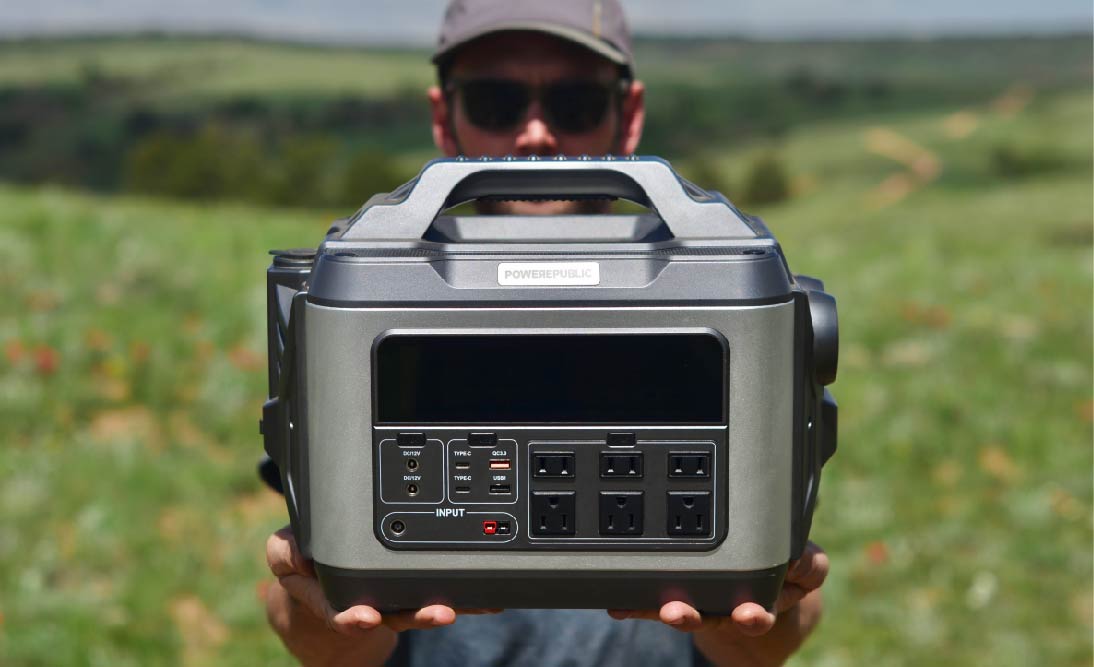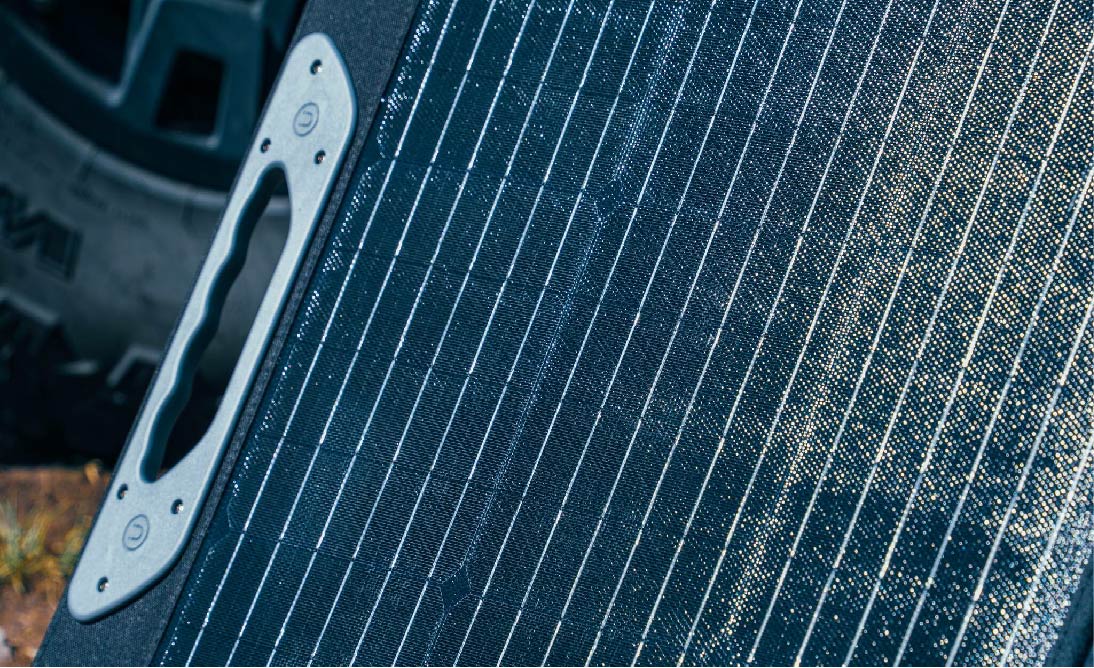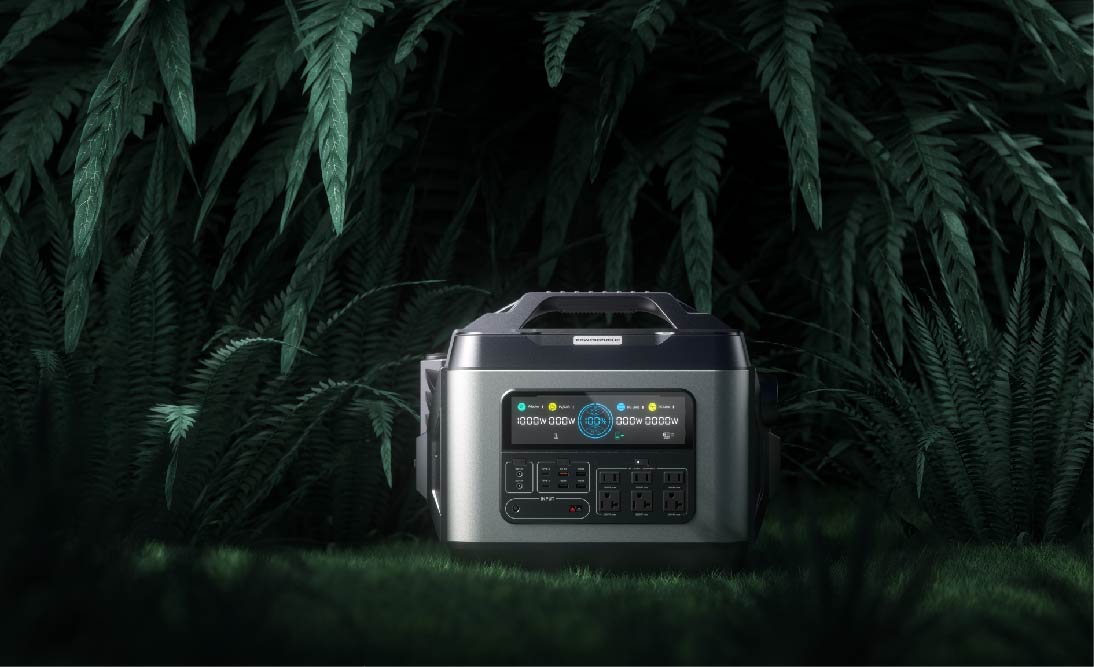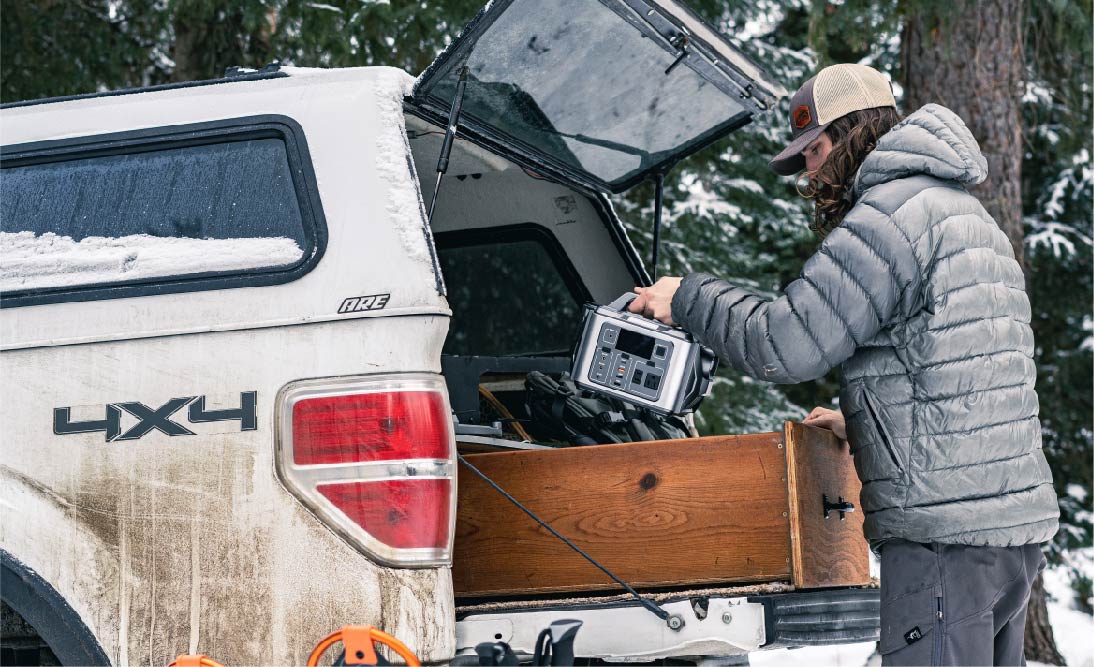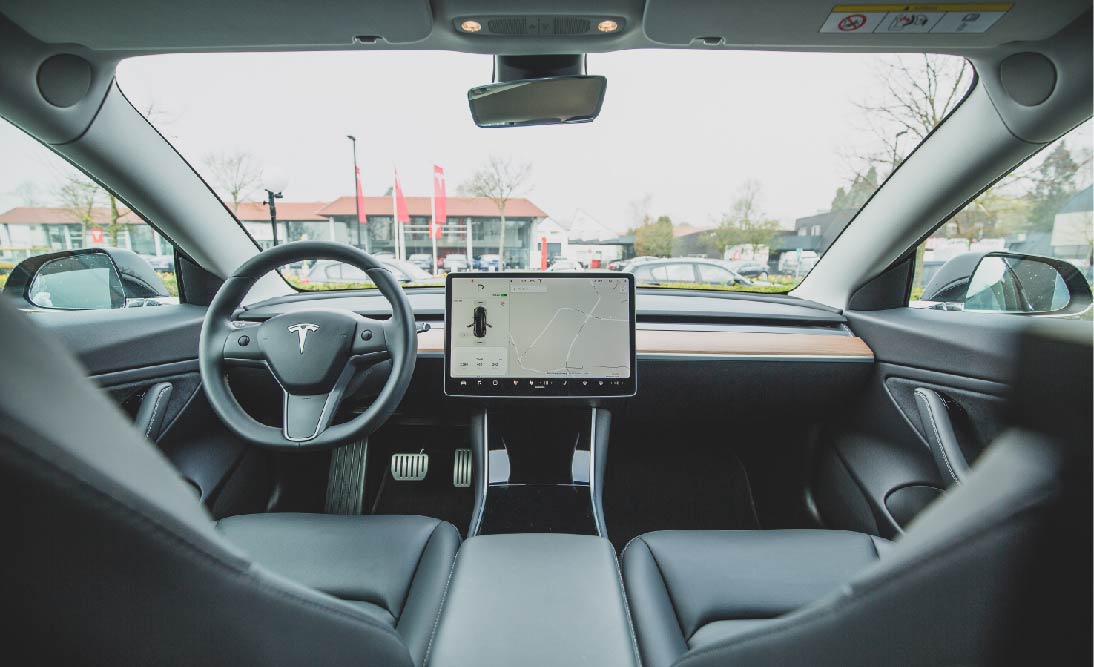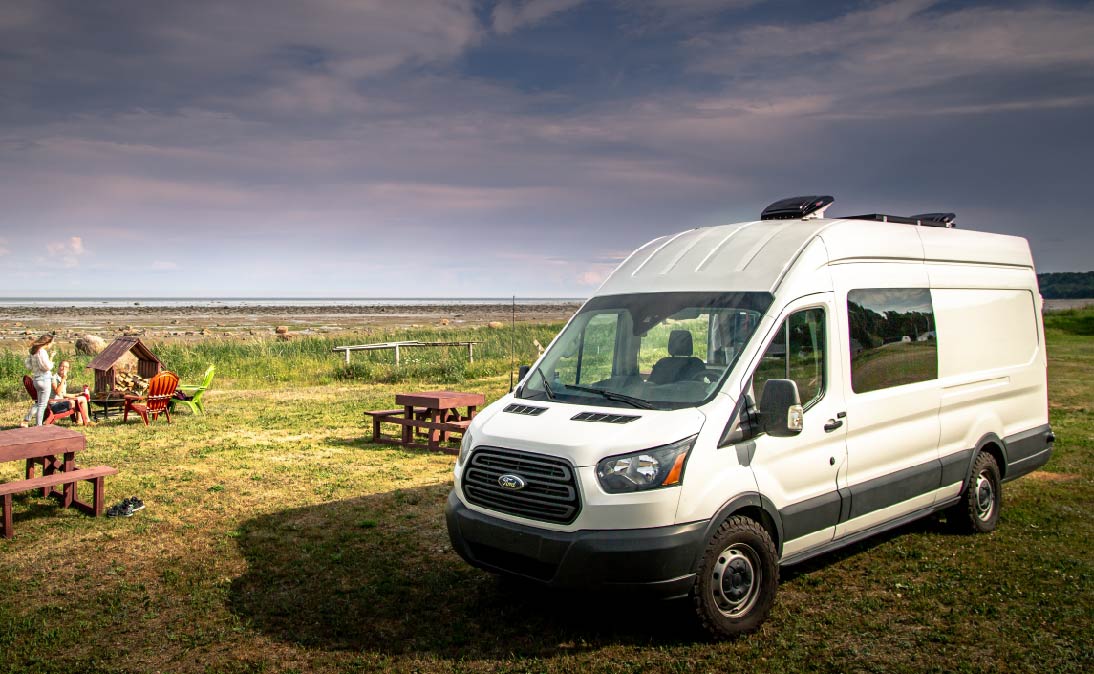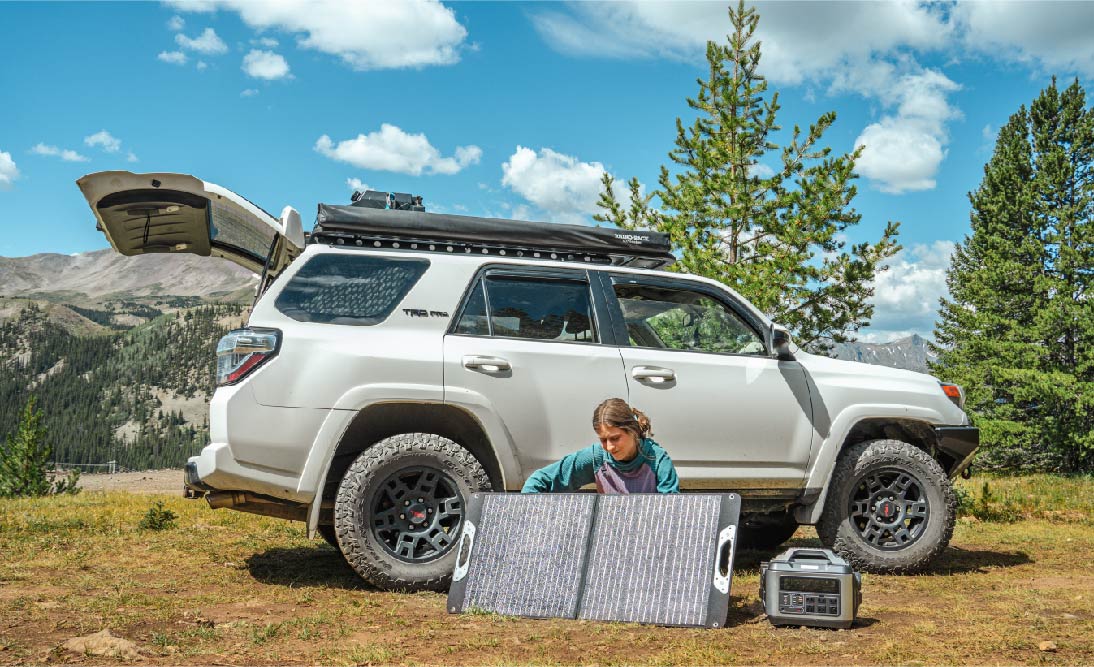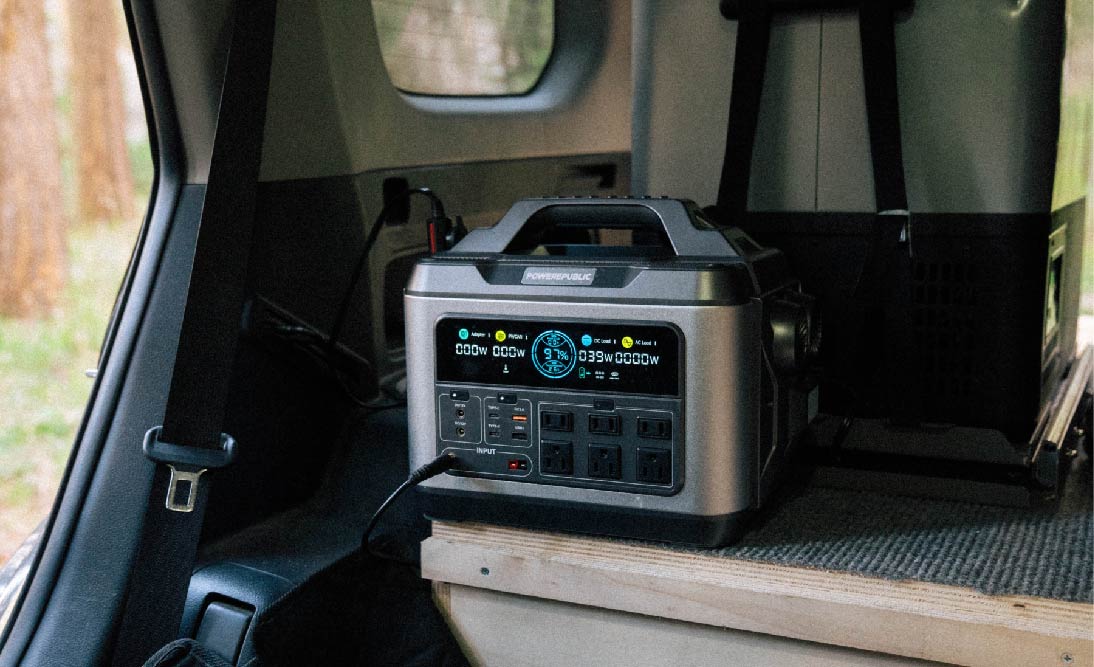Table of Contents:
Off-grid solar batteries are essential components for anyone seeking a sustainable and independent power solution, especially in areas beyond the reach of the main electricity grid. These specialized storage devices are pivotal in capturing and utilizing solar energy, playing a vital role in off-grid solar power systems. From providing energy independence to ensuring power availability during outages or in remote locations, off-grid solar batteries are at the heart of solar energy efficiency.
In this comprehensive guide, we explore the various types of off-grid solar batteries, including popular choices like Lithium-ion and LiFePO4, each offering distinct advantages in terms of energy density, safety, and lifespan. Additionally, we delve into the pros and cons of solar battery storage, provide insights on selecting the best off-grid solar batteries for your needs, and discuss innovative solutions like using portable power stations as alternative off-grid solar batteries. Highlighted in this guide are the POWEREPUBLIC models T1200, T2200, and T3000, exemplifying top choices for less demanding applications. Whether you're new to solar power or looking to enhance your existing system, this guide is your go-to resource for understanding and choosing the best off-grid solar batteries.
What are Off-Grid Solar Batteries?
Off-grid solar batteries are specialized storage devices used in solar power systems that operate independently from the main electricity grid. These batteries play a crucial role in off-grid solar setups, as they store the energy generated by solar panels during the day for use when sunlight is not available, such as at night or during overcast conditions.

How Do Off-Grid Solar Batteries Work?
The operation of off-grid solar batteries involves several key steps:
-
Energy Collection: Solar panels absorb sunlight and convert it into direct current (DC) electricity. This energy generation peaks during the day, especially in sunny conditions.
-
Energy Storage: The DC electricity from the solar panels is then directed to the off-grid solar batteries. Here, the energy is stored for later use. The capacity and efficiency of these batteries determine how much power can be saved and for how long. This is where choosing the best off-grid solar batteries becomes crucial, as higher-quality batteries can store more energy more efficiently.
-
Power Conversion and Use: When power is needed, the stored DC electricity in the batteries is converted to alternating current (AC) using an inverter. AC is the form of electricity that most home appliances and electronics use.
-
Continuous Cycling: This process of energy collection, storage, and usage repeats daily. During sunny days, the batteries recharge, and during the night or cloudy days, the stored energy is used to power connected devices and appliances.
In general, the best off-grid solar batteries are typically those that offer a high capacity, long lifespan and are durable enough to withstand frequent charging and discharging cycles.
Type of Off-Grid Solar Batteries
Off-grid solar systems require dependable batteries to store energy, and the choice of battery significantly impacts the efficiency and effectiveness of these systems. Here, we'll explore the common types of off-grid solar batteries, focusing on the two most popular kinds: Lithium-ion and LiFePO4. Understanding the differences between these batteries is key to selecting the best off-grid solar batteries for your specific needs.

1. Lithium-ion Batteries
These are widely used in off-grid solar systems due to their high energy density, which means they can store a large amount of energy in a relatively small and lightweight package. This makes them an ideal choice for systems where space and weight are constraints.
Lithium-ion batteries also have a high discharge and charge efficiency, providing reliable power when needed. Their lifespan typically ranges from 500 to 1500 charge cycles, depending on the depth of discharge and overall usage patterns. However, they can be more expensive upfront and require sophisticated management systems to ensure safety.
2. LiFePO4 (Lithium Iron Phosphate) Batteries
LiFePO4 batteries are gaining popularity as one of the best off-grid solar batteries due to their safety and stability. They have a lower risk of thermal runaway and are more stable in high-temperature environments compared to Lithium-ion batteries.
Although they have a lower energy density, LiFePO4 batteries offer a longer lifespan, often exceeding 2000 charge cycles. This makes them a cost-effective option in the long run. Additionally, they are environmentally friendly, as they do not contain cobalt, which has raised concerns in terms of ethical mining practices.
Comparing Lithium-ion and LiFePO4 Batteries
When deciding between Lithium-ion and LiFePO4 batteries for off-grid solar systems, consider the following aspects:
-
Energy Density and Size: Lithium-ion batteries are more compact for the same storage capacity, beneficial for space-limited setups. In contrast, LiFePO4 batteries are bulkier.
-
Safety and Thermal Stability: LiFePO4 batteries have an edge in safety, with reduced risks of overheating and fire.
-
Lifespan and Long-Term Cost: LiFePO4 batteries often have a longer lifespan, translating into a better long-term investment despite a higher initial cost.
-
Environmental Impact: If eco-friendliness is a priority, LiFePO4 is a more sustainable choice due to its lack of cobalt.
-
Performance in Varied Conditions: Consider the environmental conditions of your installation. LiFePO4 batteries generally perform better in a wider range of temperatures.
Ultimately, the best off-grid solar batteries will depend on your specific requirements, including budget, space constraints, energy needs, and environmental conditions. Both Lithium-ion and LiFePO4 batteries have their advantages and can be excellent choices for off-grid solar systems, provided they align with your system's goals and constraints.
Pros and Cons of Solar Battery Storage
While solar battery storage offers a sustainable and independent power solution, it requires careful consideration of the initial investment, maintenance, and space requirements. The choice should align with individual needs, budget constraints, and environmental values. By weighing these pros and cons, one can make a more informed decision to select the best off-grid solar batteries.

Pros of Solar Battery Storage
-
Energy Independence: One of the most significant advantages of solar battery storage is the independence it provides. You're not reliant on the grid, meaning power is available even during outages or in remote locations.
-
Maximizing Solar Energy Use: With battery storage, solar energy collected during peak sunlight hours can be stored and used later, reducing waste and increasing the efficiency of the solar system.
-
Reduced Electricity Bills: Utilizing stored solar energy means less reliance on grid-supplied power, leading to lower electricity bills.
-
Eco-Friendly: Using solar batteries for energy storage is a green, renewable solution that reduces carbon footprint and reliance on fossil fuels.
-
Incentives and Rebates: Many regions offer incentives for installing solar battery storage systems, making them more financially feasible.
Cons of Solar Battery Storage
-
High Initial Cost: The upfront cost of solar batteries, especially when aiming for the best off-grid solar batteries, can be significant. This includes the cost of the batteries themselves and the associated installation and system setup costs.
-
Maintenance and Lifespan: Batteries require maintenance, and over time, their efficiency decreases. This means they will eventually need to be replaced, which can be costly.
-
Space Requirements: High-capacity batteries can be bulky and require dedicated space for installation, which might be a challenge in smaller properties.
-
Complexity in Setup and Management: Integrating a battery system into an existing solar setup can be complex and might require professional assistance.
-
Environmental Concerns: Although solar batteries are eco-friendly in operation, the production and disposal of these batteries have environmental impacts, especially those not made from sustainable materials.
How to Select the Best Off-Grid Solar Batteries?
Choosing the best off-grid solar batteries is a critical decision for anyone looking to maximize the efficiency and reliability of their solar power system. Here's a guide on how to select the ideal off-grid solar batteries, complete with examples and calculations to aid in making an informed choice.

1. Determine Your Energy Needs
-
Calculate the total daily energy consumption in kilowatt-hours (kWh). This involves listing all the devices you intend to power and their wattage.
-
Example: If you use a 100W light bulb for 5 hours, a 500W refrigerator for 24 hours, and a 1500W microwave for 1 hour daily, your total consumption would be: (100W*5h)+(500W*24h)+(1500W*1h)/ 1000 = 13.5 kWh/day.
2. Assess Battery Capacity
-
Choose a battery that can store at least your daily energy requirement.
-
Example: For a system needing 13.5 kWh/day, you would need batteries that can store this amount of energy. If using LiFePO4 batteries with a capacity of 5 kWh each, you would need at least 3 of these batteries.
3. Consider Depth of Discharge (DoD)
-
Batteries should not be discharged fully for longevity. LiFePO4 batteries usually have a DoD of about 80-90%, while Lithium-ion can vary.
-
Example: With a required 13.5 kWh and LiFePO4 batteries with 80% DoD, the actual needed capacity is 13.5 kWh / 0.8 = 16.875 kWh.
4. Look at Efficiency
-
Consider the round-trip efficiency of the batteries, which affects how much of the stored energy is usable.
-
Example: If the battery has 90% efficiency, and you need 13.5 kWh, you need 13.5 kWh / 0.9 = 15 kWh of storage.
5. Evaluate Battery Lifespan and Warranty
-
Consider the number of charge cycles and the warranty offered. LiFePO4 batteries often have a longer lifespan, making them one of the best off-grid solar batteries in terms of long-term investment.
6. Budget Considerations
-
Balance the initial cost with long-term benefits. Higher-quality batteries like LiFePO4 may be more expensive upfront but offer greater longevity and reliability.
7. Brand and Reviews
-
Research brands and read user reviews. Look for companies with a strong reputation in the solar industry. Websites like Trustpilot will provide ratings for brands and companies.
8. Safety Features
-
Prioritize batteries with built-in safety features like overcharge and deep discharge protection, especially important for Lithium-ion batteries.
9. Example
-
Suppose you decide on LiFePO4 batteries for their safety and lifespan. For a daily need of 13.5 kWh, considering 80% DoD and 90% efficiency, you would need around 16.875 kWh of total capacity.
-
Choosing three 5.6 kWh LiFePO4 batteries would cover this requirement, offering a robust, efficient, and long-lasting solution for your off-grid solar system.
So selecting the best off-grid solar batteries involves a thorough evaluation of your energy needs, battery capacity, efficiency, lifespan, budget, and environmental factors. Careful consideration of these aspects ensures you invest in a solar battery system that meets your specific energy requirements efficiently and reliably.
Is It Possible To Use Portable Power Stations as Off-Grid Solar Batteries?
Yes, It is possible!
Portable power stations can be used as off-grid solar batteries, but their appropriateness largely depends on the specific requirements of the application. They can serve as an alternative to traditional off-grid solar batteries, especially in situations where portability and versatility are essential.

Why It's Feasible?
-
Integrated Features: Many portable power stations come with built-in inverters, solar charging capabilities, and various output ports, making them a compact and versatile solution.
-
Flexibility: They are ideal for mobile off-grid applications like camping, RVs, or emergency power backup, where stationary batteries might not be practical.
Pros of Using Portable Power Stations as Off-Grid Solar Batteries
-
Portability: They are lightweight and easy to transport, offering flexibility in location and usage.
-
Ease of Use: With plug-and-play functionality, they are user-friendly, requiring minimal setup.
-
Versatility: Capable of powering a range of devices thanks to multiple output options.
Cons of Using Portable Power Stations as Off-Grid Solar Batteries
-
Limited Capacity: Typically, they have lower energy storage capacities compared to traditional off-grid solar batteries.
-
Cost Efficiency: Per watt-hour, portable power stations might be more expensive than standard off-grid solar batteries.
-
Durability for Long-Term Use: They may not offer the same long-term durability and cycle life as conventional off-grid solar batteries.
Factors to Pay Attention To
-
Energy Requirement Calculation: Assess how much energy you need daily. For instance, if your total device consumption is 2kWh/day, a portable power station with a capacity of 2kWh would be necessary.
-
Battery Capacity and Efficiency: Check the watt-hour rating and efficiency. A 1000Wh portable power station with 90% efficiency effectively provides 900Wh of usable energy.
-
Solar Charging Capability: Ensure it can be efficiently charged with solar panels. A station with a solar input of 200W will take approximately 5 hours to charge fully in ideal sunlight conditions.
-
Inverter Size: The inverter should be able to handle the peak load of your appliances.
-
Portability vs. Stationary Needs: Weigh the need for mobility against the energy capacity limitations.
-
Cost Analysis: Compare the cost of portable stations to traditional off-grid solar batteries. For example, a 1000Wh portable power station costing $1000 has a cost of $1/Wh, while a stationary 5kWh battery system at $3000 costs $0.6/Wh.
Example and Calculation
-
Suppose you have a portable power station with a capacity of 1000Wh (1kWh) and an efficiency of 90%.
-
If your daily power requirement is 500Wh, this power station can theoretically last for about two days on a single charge (1000Wh * 90% efficiency / 500Wh per day). This makes it suitable for light off-grid usage like powering small devices or lighting.
-
However, for more demanding applications (e.g., running a refrigerator, TV, or tools), a larger capacity or multiple power stations would be necessary.
So, while portable power stations can serve as off-grid solar batteries for specific, less demanding applications, they may not be entirely suitable for more extensive off-grid setups due to their limited capacity and durability. Careful assessment of your power needs and comparison with the capabilities of portable power stations will guide you in selecting the best off-grid solar batteries.
POWEREPUBLIC Off-Grid Solar Batteries
For those of you searching for the best off-grid solar batteries suitable for specific and less demanding applications such as camping, van life, RV life, and during power outages, consider the POWEREPUBLIC T1200, T2200, and T3000 portable power stations. With a range from 1200W to 3000W and battery capacities from 1110Wh to 3200Wh, these models are excellent choices for less demanding off-grid applications.

To better evaluate the functionality of these three models, check out the table below which details their important features and estimated operation times.
|
Feature/Model |
|||
|
Capacity |
1110Wh/50,000mAh |
2240Wh/100,000mAh |
3200Wh/125,000mAh |
|
Continuous Power |
1200W |
2200W |
3000W |
|
Starting Power |
2600W |
4500W |
6000W |
|
Battery Type |
Lithium-Ion(800+ cycles) |
LiFePO4 Batteries(3000+ cycles) |
LiFePO4 Batteries(3000+ cycles) |
|
Number of Output Ports |
13 Output Ports |
15 Output Ports |
15 Output Ports |
|
Charging Methods |
AC Adapter, Solar Panel, Car Charger |
AC Adapter, Solar Panel, Car Charger |
AC Adapter, Solar Panel, Car Charger |
|
Solar Input |
230W |
230W |
230W |
|
Weight |
31Ibs/14Kg |
64Ibs/30Kg |
88Ibs/40Kg |
|
Dimensions |
14.3*9.3*10.6 Inch |
18.3*11.8*12.2 inch |
18.3*11.8*14.5 inch |
|
Check out POWEREPUBLIC’s rating on Trustpilot(4.5/5). |
|||
|
Est.Operation Time(h) |
The operation time(h)=Capacity(Wh) * 0.85 / The power of the item(W) |
||
|
TV (100W) |
9.5 hours |
19 hours |
27 hours |
|
Microwave Oven (800W) |
1.2 hours |
2.4 hours |
3.4 hours |
|
Coffee Maker (1000W) |
1 hour |
2 hours |
2.7 hours |
|
Refrigerator (1200W) |
0.7 hours |
1.5 hours |
2.2 hours |
|
Washing Machine (1500W) |
/ |
1.2 hours |
1.8 hours |
|
Air Conditioner (2000W) |
/ |
1 hour |
1.3 hours |
|
Electric Grill (2200W) |
/ |
0.8 hours |
1.2 hours |
|
Portable Space Heater (3000W) |
/ |
/ |
1 hour |
Note That:
-
For a simpler comparison, please visit our Compare page for additional information.
-
The estimated operation time assumes the use of one item at a time with the battery fully charged. Note that the wattages for devices and appliances can differ based on the brand.
-
It's important to check both the running and starting wattage of your device as well as the portable power station to ensure they are compatible. The wattage of your device, both running and starting, should NOT surpass that of the portable power station.
FAQ I: Are Solar Batteries Worth the Money?
Answer: Off-grid Solar batteries are often worth the investment, particularly for those seeking energy independence or living in areas with frequent power outages.

The worth of solar batteries hinges on several factors:
-
Energy Independence: By storing solar energy, you're not reliant on the grid. This is especially valuable in remote locations or areas with unreliable power supplies.
-
Cost Savings: Over time, using stored solar energy can significantly reduce electricity bills. For example, if you typically consume 500 kWh per month from the grid at a rate of $0.12 per kWh, you spend $60 monthly. With solar batteries, this cost can be significantly reduced or even eliminated.
-
Incentives: Many regions offer rebates or tax credits for solar battery installations, enhancing their value.
-
Long-Term Investment: High-quality solar batteries, like LiFePO4, have longer lifespans (up to 3000+ cycles) and can be a wise long-term investment.
FAQ II: What’s the Cost of Solar Battery Storage?
Answer: The cost of solar battery storage varies depending on capacity, technology, and brand.

For instance:
-
Initial Cost: A typical home solar battery system might cost between $5,000 to $15,000. For example, a 10 kWh LiFePO4 battery system may cost around $7,000.
-
Long-Term Savings: Over time, the cost is offset by savings on electricity bills. Using the earlier example of $60 monthly savings, the system could save $720 per year, making it financially beneficial in the long run.
-
Maintenance: Solar batteries require minimal maintenance, but eventual replacement costs should be considered.
FAQ III: How to Store Solar Energy?
Answer: Storing solar energy involves capturing sunlight via solar panels and storing it in batteries for later use.

Here's how:
-
Energy Collection: Solar panels convert sunlight into DC electricity. For example, a 300W panel under optimal conditions generates around 2.4 kWh of energy per day (300W * 8 hours of sunlight).
-
Energy Storage: This energy is stored in solar batteries. If your daily consumption is 2.4 kWh, a battery with at least this capacity is needed. For instance, a 5 kWh battery can store this amount and have extra capacity for less sunny days.
-
Usage Calculation: To determine how long the stored energy will last, divide the battery capacity by your daily usage. Using the 5 kWh battery example, if you use 2.4 kWh daily, the battery can theoretically last for about two days (5 kWh / 2.4 kWh/day).
-
Efficiency Factors: Consider the efficiency of the system. If the battery has a 90% efficiency, the usable energy would be 90% of its capacity (5 kWh * 90% = 4.5 kWh).
Solar energy storage is an evolving technology, offering increasing efficiency and capacity. The right system depends on individual energy needs, budget, and installation conditions. By understanding these dynamics, you can make a more informed decision about incorporating solar battery storage into your energy plan.
Final Thoughts
In summary, selecting the best off-grid solar batteries is a key decision for efficient and sustainable solar power systems. With options like Lithium-ion and LiFePO4 batteries, each offers unique benefits in terms of energy density, safety, and lifespan. These batteries provide energy independence, especially valuable in areas without reliable grid power.
For less demanding applications, POWEREPUBLIC T1200, T2200, and T3000 stand out as top choices. They combine portability with sufficient power, making them ideal for scenarios like camping or RV living. The right off-grid solar battery choice balances initial cost, long-term savings, and environmental impact. By carefully evaluating your energy needs and considering these factors, you can ensure a sound investment in the best off-grid solar batteries for your specific requirements, enhancing both efficiency and reliability in your solar power setup.
Click here to explore more about POWEREPUBLIC Portable Power Station!









